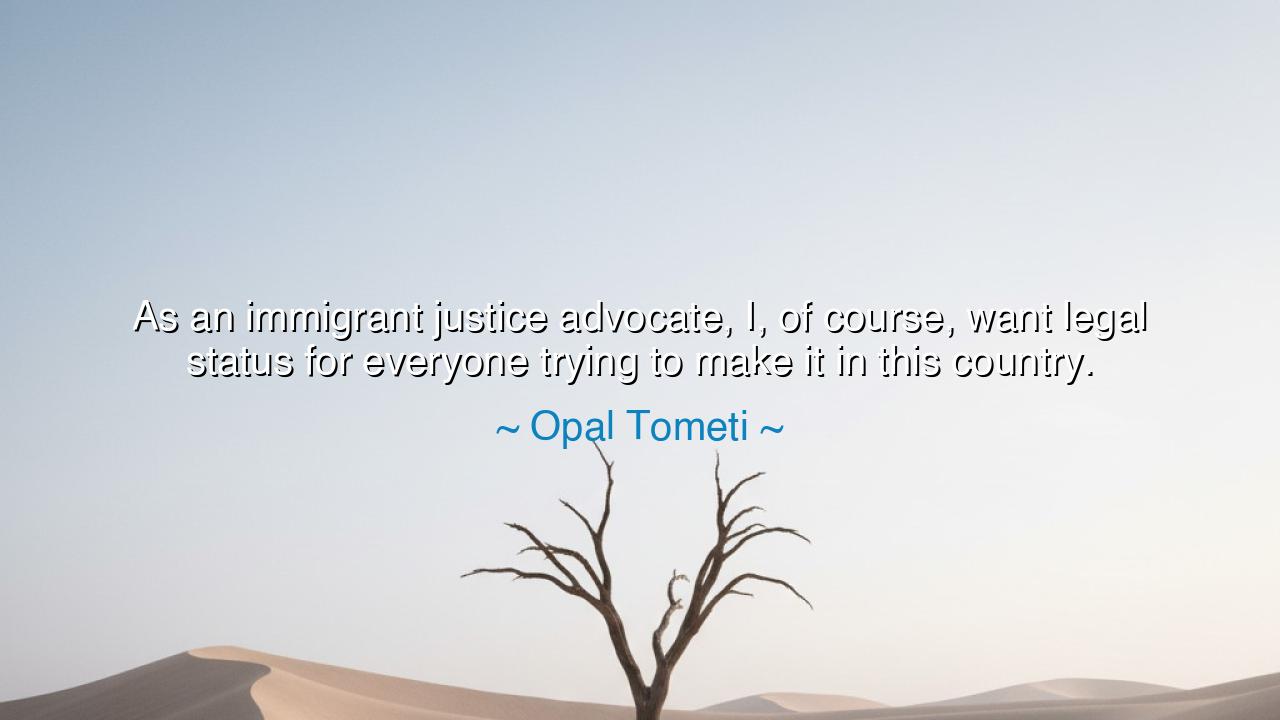
As an immigrant justice advocate, I, of course, want legal status
As an immigrant justice advocate, I, of course, want legal status for everyone trying to make it in this country.






"As an immigrant justice advocate, I, of course, want legal status for everyone trying to make it in this country." Thus spoke Opal Tometi, daughter of Nigeria and co-founder of the Black Lives Matter movement, whose voice rises as a herald for the displaced, the exiled, and the striving. Her words are not abstract but rooted in the lived struggle of those who cross borders in search of dignity. She proclaims that legal status is not a privilege for a chosen few, but a birthright of humanity itself, a foundation upon which the weary may build lives free from fear.
The origin of this wisdom lies in the history of migration itself, for humankind has always been a wandering people. Tribes crossed deserts, sailed oceans, and climbed mountains in search of safety, sustenance, and hope. Yet, with the drawing of borders and the rise of nations, many who wander find themselves cast as strangers, stripped of recognition, treated not as neighbors but as intruders. Tometi, as an immigrant justice advocate, lifts her voice to declare that the true strength of a nation is not found in exclusion, but in embracing those who seek to labor, to contribute, and to belong.
History offers a striking example in the story of Ellis Island, where millions of immigrants passed into the United States at the turn of the twentieth century. Many came poor, speaking strange tongues, carrying little but hope. At first, they too faced suspicion, hostility, and discrimination. Yet over time, they built the factories, tilled the fields, raised the railroads, and gave birth to generations who would define the nation itself. What was once foreign became part of the very heart of America. Tometi’s words echo this truth: that those who come to “make it in this country” are not burdens, but builders, and that legal status simply acknowledges their rightful place in the story of the land.
Her statement also unmasks the cruelty of life without legal status. To live in the shadows is to live half a life—always working, never resting; always fearing, never secure. Children grow with uncertainty, parents labor without protection, families live at risk of separation. This is not the destiny of human beings, but a wound inflicted by unjust systems. Tometi calls us to see that granting status is not mere generosity, but justice: the restoration of dignity to those who already labor, already sacrifice, already enrich the soil of the nation.
There is in her words a heroic defiance of fear. For many oppose such justice, believing that borders must remain walls rather than bridges. But Tometi, like prophets of old, insists that humanity is greater than nationality, and that compassion is stronger than exclusion. She sees in immigrants not strangers, but reflections of ourselves: for every family once fled famine or persecution, every ancestor once walked as a stranger in a new land. Her advocacy is not charity, but remembrance—an eternal truth: we all belong to one another.
The lesson is clear: if a nation is to be great, it must embrace the stranger, for in doing so it embraces its own future. The gifts of immigrants—labor, creativity, resilience—are seeds that bloom into prosperity for all. To deny legal status is to deny those seeds the chance to flourish. To grant it is to ensure that justice, dignity, and opportunity extend beyond lines on a map to touch the fullness of humanity.
What practical steps must we take? Demand policies that offer clear and humane pathways to legal status. Stand with immigrant communities, not in pity, but in solidarity. Tell their stories, honor their struggles, defend their rights in workplaces, schools, and neighborhoods. And above all, remember that justice is not abstract: it is the act of lifting burdens from the shoulders of the weary, of opening doors that have been shut, of affirming that every human being deserves to live without fear.
So let Opal Tometi’s words ring out as both a declaration and a call: legal status for all who strive is not a dream, but a duty. For when we grant recognition to the stranger, we do not weaken the nation—we fulfill its promise, we strengthen its soul, and we write a story worthy of the generations yet to come.






AAdministratorAdministrator
Welcome, honored guests. Please leave a comment, we will respond soon